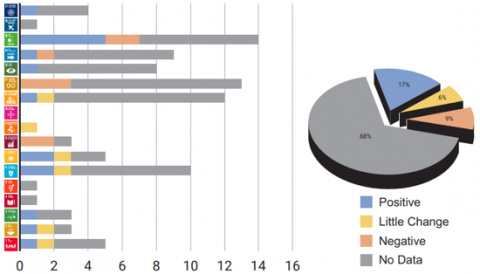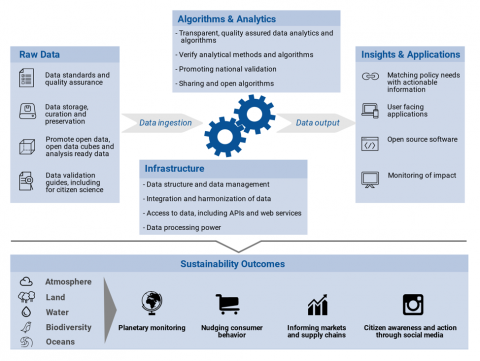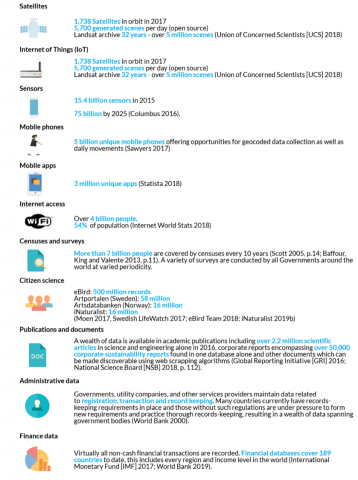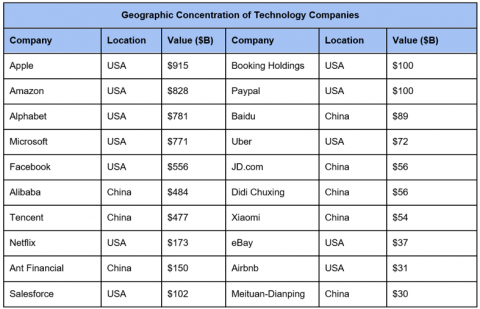We currently make environmental decisions and invest financial and human resources based on assumptions, anecdotal evidence, and patchy data. We cannot assess progress for 68% of the 93 environment-related SDG indicators due to a lack of data (see Figure 1). A digital ecosystem for the environment would provide people with the data and insights necessary to make better natural resource governance decisions, target financial investments, and change consumption and production patterns. This has the potential to transform social, political, and economic systems toward environmental transparency and sustainable development.

Figure 1. Progress toward the environment-related SDG indicators. UN Environment.
Bringing Together Science, Policy, and Business
UN Environment has been working with companies, academics, member states, and civil society actors through the UN Science Policy Business Forum to envision a global digital ecosystem for the environment. This forum recently released a flagship discussion paper outlining the contours of such a vision in March 2019 and blog summaries were published by Reuters and the International Institute for Sustainable Development. A digital ecosystem for the environment would need to bring together data, data infrastructure, and analytics in order to produce actionable insights and information.

We Need Data
We need to identify what information is already available, how we can fill information gaps, and promote data collection by governments, companies, academics, and citizens. We need to ensure we have the right information for the right decision at the right time in the right format. It is critically important to not only map negative trends, but also find and scale solutions hand in hand with end users. The lack of policy-relevant data was a key finding in the 6th Global Environment Outlook. However, we also have a wealth of mostly untapped data which are captured from satellites, the Internet of Things, sensors, and other sources. A digital ecosystem for the environment must deliver data and insights in a way that is accessible, open, and analyzed such that it links to policy, markets, consumer behavior, and social media.

Data and Technology Asymmetry Risks
Currently, much of the big data and technological advancements are held by a handful of companies. This not only creates imbalance in terms of who has access to data to make decisions, influence markets, and determine investments, but it also creates concerns in terms of privacy and power. It is likely that few nations realize how much potential leverage companies gain over their economies through data and processing power. As we take forward a vision for building a global digital ecosystem of environmental data, algorithms, and insights, three key risks need to be mitigated:
- We need to empower governments and people to understand and use data and to ensure holders of data are accountable, as opposed to having a majority of global data controlled by a few companies in a few countries.
- We need mechanisms to ensure the quality and openness of data and algorithms to ensure public trust.
- We need frameworks to protect individual privacy, data security, and intellectual property.

We Must Move Forward Together
The future is what we make it. To pursue a digital ecosystem for the environment:
- Citizens must be engaged and empowered to use data and information to improve their own lives, communities, and environment.
- Countries must create a policy environment that promotes open data and a culture of data integration, use, innovation, and governance.
- Academics can contribute to researching environmental priorities and new and emerging trends in order to develop actionable knowledge and solutions.
- Public-private partnerships are needed to leverage private sector expertise and infrastructure in data science, cloud computing, and artificial intelligence to share data and to promote the use of technology for global public goods.
- The UN should take a leadership role and make a long-term investment in a digital ecosystem for the environment, including new and innovative partnerships with all key actors.
We have important choices to make in terms of how data and technologies are governed and used and to hold governments and companies accountable. With the right data to make crucial decisions in the decade ahead, we can all be on the right side of human history.